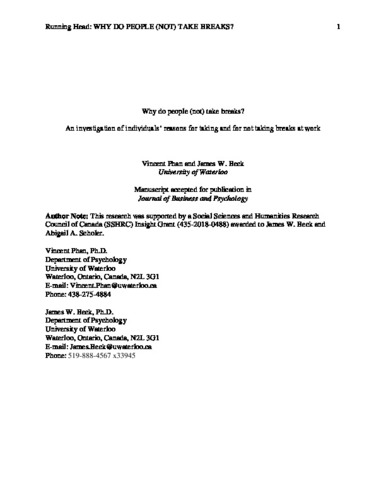| dc.contributor.author | Phan, Vincent | |
| dc.contributor.author | Beck, James W. | |
| dc.date.accessioned | 2023-05-02 16:57:57 (GMT) | |
| dc.date.available | 2023-05-02 16:57:57 (GMT) | |
| dc.date.issued | 2023 | |
| dc.identifier.uri | https://doi.org/10.1007/s10869-022-09866-4 | |
| dc.identifier.uri | http://hdl.handle.net/10012/19391 | |
| dc.description | This is a post-peer-review, pre-copyedit version of an article published in Journal of Business and Psychology. The final authenticated version is available online at: https://doi.org/10.1007/s10869-022-09866-4 | en |
| dc.description.abstract | Although breaks can help employees stay energized and maintain high levels of performance throughout the day, employees sometimes refrain from taking a break despite wanting to do so. Unfortunately, few studies have investigated individuals’ reasons for taking and for not taking a break at work. To address this gap, we developed a model for predicting employees’ break-taking behaviors. We developed hypotheses by integrating theories of work stress, self-regulation, and the results of a qualitative survey conducted as part of the current research (Study 1). Specifically, we predicted that high workloads would be positively related to the desire to detach from work, but that at the same time, high workloads would also deter employees from actually taking breaks. Further, we predicted that employees would be less likely to act upon their desire to take a break within an environment where breaks are frowned upon by supervisors and coworkers, relative to an environment where breaks are allowed and encouraged. The results of a daily diary study of full-time employees (Study 2) provided general support for these predictions. Altogether, this research provides insights into the manner in which employees’ psychological experiences and characteristics of the work environment combine to predict break-taking. | en |
| dc.description.sponsorship | Social Sciences and Humanities Research Council of Canada (SSHRC), Insight Grant 435-2018-0488 | en |
| dc.language.iso | en | en |
| dc.publisher | Springer | en |
| dc.relation.ispartofseries | Journal of Business and Psychology; | |
| dc.subject | breaks | en |
| dc.subject | recovery | en |
| dc.subject | self-regulation | en |
| dc.subject | break antecedents | en |
| dc.subject | micro-break climate | en |
| dc.title | Why do people (not) take breaks? An investigation of individuals’ reasons for taking and for not taking breaks at work | en |
| dc.type | Article | en |
| dcterms.bibliographicCitation | Phan, V. & Beck, J. W. (2022). Why do people (not) take breaks? an investigation of individuals’ reasons for taking and for not taking breaks at work. Journal of Business and Psychology, 38(2), 259–282. https://doi.org/10.1007/s10869-022-09866-4 | en |
| uws.contributor.affiliation1 | Faculty of Arts | en |
| uws.contributor.affiliation2 | Psychology | en |
| uws.typeOfResource | Text | en |
| uws.peerReviewStatus | Reviewed | en |
| uws.scholarLevel | Faculty | en |
| uws.scholarLevel | Graduate | en |

